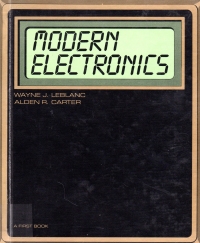 Perhaps the theme of this year’s reading will be “Clearing out thin books from the shelves and side tables.” This particular volume is an old “juvenile” book about electronics as you can see from the cover. I say “juvenile” in quotes because books don’t really get classed as “juvenile” any more, do they? It’s “young adult” now. I suspect it’s more to avoid the criminal association that developed from “juvenile” or to make juveniles feel better about themselves (young adults, so let us vote!) than because people using the word in conversation were getting juvenile confused with Juvenal.
Perhaps the theme of this year’s reading will be “Clearing out thin books from the shelves and side tables.” This particular volume is an old “juvenile” book about electronics as you can see from the cover. I say “juvenile” in quotes because books don’t really get classed as “juvenile” any more, do they? It’s “young adult” now. I suspect it’s more to avoid the criminal association that developed from “juvenile” or to make juveniles feel better about themselves (young adults, so let us vote!) than because people using the word in conversation were getting juvenile confused with Juvenal.
But enough about me. About this book.
It’s a bit of an anachronism by now, surely, with its references to Radio Shack or your local electronics store (or to juveniles who might be interested in engineering) and a bit of optimistic wonder about what the future could bring since about forty years of integrated circuits brought us small radios, personal computers, and more (the answer, almost forty years on, is Web sites that exacerbate tensions between political factions and devices that listen in on you to help you with simple things and to better determine your psychology for tech companies’ benefit).
It might also tip a little bit to why the study of electronics might have fallen off a cliff. The basic progression of the book is:
- Basic chemistry: Electrons and atoms.
- Power source/circuits.
- AC/DC.
- Basic electronic parts: resistors, capacitors, diodes. Complete with diagrams and experiments.
- Chips and circuit boards with no real diagrams.
- Magic.
It doesn’t talk much about chip architecture or how electronic devices (even in those days) have a lot of chips that you can’t really do anything with. Well, I guess you can with chip programming things, but tinkering has gotten so much more complicated these days.
Still, I got something out of the book. A reminder about different electronic components, including an explanation of diodes and capacitors that made sense to me. So there’s something to be said about reading children’s books in fields you’re not studied in.
I have many fields in which I wish I had time to dedicate more study (one of the other being music), but, getting and spending, I’ve laid waste my powers. Books like this make me wonder why I didn’t spend more of my youth studying these pursuits since they really are rather simple at the foundational level. I suppose it’s half because my recognition of how much I had to learn in these fields overwhelmed me and made them seem more inscrutible than they are and half because I’m lazy and like to read books.


